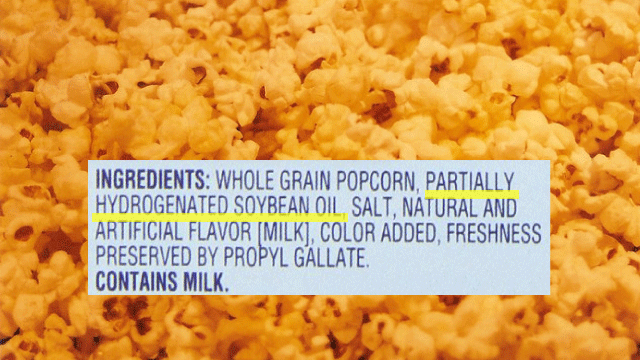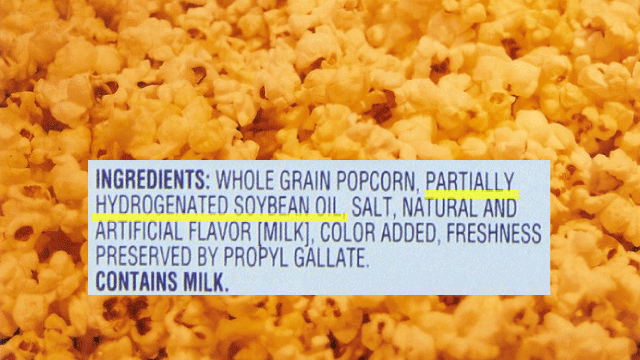
Good news, health nuts! This month, the FDA announced that they will be instituting a ban on trans fats, removing them from their list of ingredients that are “generally recognized as safe” (GRAS).
The New York Times reported that this “means companies would have to prove that such oils are safe to eat, a high hurdle given that scientific literature overwhelmingly shows the contrary. The Institute of Medicine has concluded that there is no safe level for consumption of them, a conclusion that the F.D.A. cited in its reasoning.” It’s extremely unlikely that companies will be able to find evidence of the safety of trans fats.
By deeming trans fats not safe for consumption, this will prevent food producers from including them in their products.
What are trans fats?
Trans fats are derived from liquid vegetable oils that are treated with hydrogen. This creates a solid substance so that it can be used in foods (often as a cheap butter substitute like margarine). It also acts as a preservative, as it has a very long shelf life.
Trans fats also contribute to high levels of “bad” cholesterol, raising LDL (low-density lipoprotein) levels while conversely lowering levels of HDL (high-density lipoprotein), the “good” cholesterol. This has been repeatedly proven to be a strong contributor to heart disease, which is the #1 killer in America.
In her book Healing the Gerson Way, Charlotte Gerson describes trans fats as a “heart attack in a box,” and adds that, in addition to their effect on cholesterol, “they leave fatty deposits in the arteries, cause digestive disorders and reduce the absorption rate of essential vitamins and minerals.”
Somewhat ironically, trans fats were at one point advertised as a healthy alternative to saturated fats—remember when margarine was heavily touted as the “healthy” alternative to butter?
Now, the FDA states that “trans fat provides no known health benefit and that there is no safe level of consumption of artificial trans fat.”
Where are trans fats found?
Junk food, mostly. Trans fats are found in things like donuts, stick margarine, French fries and other fried foods, snack foods, crackers, frozen dinners, chips, non-dairy creamers and other foods that you probably already know aren’t good for you. On food labels, you will often find trans fats under the name of “partially hydrogenated vegetable oils” (such as soybean oil, cottonseed oil, palm oil, etc) and they are also sometimes referred to as “trans fatty acids.”
Fortunately, as the evidence has mounted over the years and public outcry has given trans fats such a (deservedly) bad rap, many major companies have already gone ahead and removed trans fats from their products. Now, they tout their trans fat-free foods as a selling point to make their brands appear more health-conscious.
It has yet to be determined how soon this ban will go into effect, but if you want to avoid ingestion of trans fats in the meantime, read labels, avoid processed foods and stick to an organic diet consisting of fresh whole foods, fruits and vegetables. Think kale chips, not potato chips.
Why does it matter?
If you’re not a junk food junkie and aren’t eating foods that contain trans fats, this might not affect you much personally. On the Gerson Therapy, fat consumption is restricted to flax oil, and processed foods are totally eliminated, so thankfully there was no risk of Gerson patients ingesting these hazardous substances.
But, the implications for public health could be huge. The FDA estimates that the ban on trans fats could prevent up to 20,000 heart attacks and 7,000 deaths per year. This is absolutely a step in the right direction!
The FDA hasn’t removed a food from the GRAS list in decades—not since 1969, to be exact. We hope that this decision will encourage the FDA to take a closer look at other potentially hazardous ingredients lurking in our food supply, such as artificial sweeteners, GMOs, high fructose corn syrup and other artificial additives.



Comments2
Ally,
Another “food” to be evaluated should be the “natural flavorings” label. I believe it to be nothing more than an aroma chemical and yet it is in everything bottled or packaged. Consumers believe it to mean something of natural origin, but the specific food not stated, in other words. I would like this to be brought into light. As the aroma chemical manufacturing business is a multi billion dollar business.
Thank you for your hard work.
My question is, why the FDA doesn’t ban ASPARTAME??? Not only they don’t ban it but a petition was filed to approve inclusion of aspartame on milk products WITHOUT requiring the manufacturers to note it on the label. It’s atrocious!
Comments are closed.